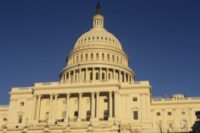White House moves to ease regulatory burdens, strengthen the economy

In January of this year, President Obama announced that the federal regulatory system “must measure, and seek to improve, the actual results of regulatory requirements.” He ordered what the White House call “an unprecedentedly ambitious government-wide review of existing federal regulations.” Federal agencies and departments were directed to produce plans to “eliminate red tape and to streamline current requirements,” according to the administration.
requirements.” He ordered what the White House call “an unprecedentedly ambitious government-wide review of existing federal regulations.” Federal agencies and departments were directed to produce plans to “eliminate red tape and to streamline current requirements,” according to the administration.
On August 23 Cass Sustein, administrator of the Office of Information and Regulatory Affairs, announced a wide range of reforms that he said will likely result in more than $10 billion in monetized savings in the next five years.
“Agencies will continue to revisit existing rules, asking whether they should be updated, streamlined, or repealed. And they will do so in close consultation with the public,” said Sunstein.
Sunstein cited these reg reform examples:
- The Department of Health and Human Services will soon propose to remove unnecessary regulatory and reporting requirements now imposed on hospitals and other healthcare providers, potentially saving an anticipated $4 billion over the next five years.
-
The Department of Transportation is proposing a rule that will eliminate unnecessary regulation of the railroad industry, saving up to $340 million in the near future, and avoiding the risk that regulatory costs will be passed onto consumers.
- By the end of this year, the Internal Revenue Service will eliminate 55 million hours in annual paperwork burdens by consolidating reporting requirements and streamlining various tax forms.
“Many of the new reforms focus specifically on small business,” said Sunstein. “For example, the Department of Defense recently issued a new rule to accelerate payments on contracts to as many as 60,000 small businesses, thus improving their cash flow in an economically difficult time.
“Today’s cost-reducing reforms complement, and do not displace, our continuing efforts to safeguard public safety and our environment. As President Obama has said, ‘We can make our economy stronger and more competitive, while meeting our fundamental responsibilities to one another.’ We will continue to eliminate unjustified regulatory costs, and thus strengthen our economy, while taking sensible, cost-effective, evidence-based steps to protect public health and welfare.”
Looking for a reprint of this article?
From high-res PDFs to custom plaques, order your copy today!





